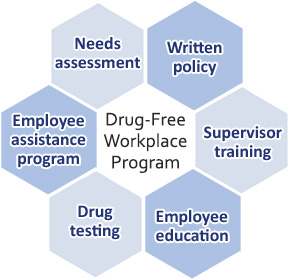
An important part of an effective drug-free workplace program is having an employee assistance program (EAP). The EAP particularly serves employees struggling with drug abuse.
The Department of Labor cites three reasons for including an EAP in a company’s drug-free workplace program:
1. To recognize employees as vital to the business and valuable members of the team.
2. Offering assistance to employees produces more benefits than firing them.
3. Recovering employees can once again become productive and effective members of the workforce.
Why have an EAP in a drug-free workplace?
An EAP serves as a proactive measure to catch employee addiction issues before they escalate. An EAP can intervene in the early stages of addiction and direct employees to the proper sources of help. This offers an employee a chance to recover and regain productivity in the workplace.
To foster an effective EAP, the company should widely explain the EAP to employees, clearly define a company’s drug abuse policy, and provide education and access to drug addiction resources. Also, they should specify the percentage of treatment costs the company will cover.
The Department of Labor provides a sample EAP policy on their website.
Prevalence of Employee Drug Abuse
The National Survey on Drug Use and Health found that in 2013, of 21.6 million people classified with substance dependence or abuse, 11.3 million of them were employed full-time. That means that of the U.S.’s total 2013 workforce of 143 million, roughly 8% were classified with substance dependence or abuse.
Many employees struggle with drug abuse. Many if not all companies will encounter an employee dealing with drug addiction. An effective EAP serves as a company’s best preparation for this eventuality.
Security of EAP’s
A typical EAP offers both job security and privacy to deal with drug addiction.
First, an effective EAP assures an employee they will not be terminated if they confess to having a drug problem – or if a supervisor refers them to the EAP. With an effective EAP, the company promotes the well-being of their employees instead of firing them.
Second, when an employee seeks treatment from a source referred by the EAP, while an employee’s supervisor will learn an employee contacted a help provider, the supervisor does not learn the nature of the problem. An employee seeking help under an EAP has privacy rights – the confidentiality of their treatment and progress.
3 reasons to retain an existing employee
Intelligent companies will help an existing, trained employee recover from addiction instead of hiring a new employee.
First, losing an employee means losing the knowledge that worker amassed during their employment. A company can replace skills, but not insider knowledge. Thus, with an employee’s departure, the client insights, methodologies, and other expertise depart the company as well.
Second, hiring a new employee can prove costly. Placing job ads, recruiting, interviewing, employee screening, and setup for a new employee can cost up to $3,500 for a minimum wage employee.
Finally, hiring any new employee is a risk. The new employee may fail to integrate with the workplace, have a change of heart, or simply use their position as a launchpad to a better job.
An EAP that helps existing employees recover from drug addiction not only invests in the workforce’s well-being (an investment likely repaid in employee loyalty), but also proves economically viable.
Benefits of EAP’s to companies
An EAP can limit workers’ compensation claims and potential insurance costs incurred by an employee becoming ill or unable to work as a result of drug addiction.
Further, an EAP acts as the centerpiece of a drug-free workplace program. Under New York State Industrial Code Rule 60, compliant return to work & drug-free workplace policies result in a mandated 6% credit on workers’ compensation insurance premiums. These credits occur in the first calendar year after they’re approved.
Mobile Health
Drug testing helps to support a drug-free workplace. Mobile Health offers extensive employee screening services including drug testing, employee physical exams, tb tests, flu shots, and other occupational health services.
In addition, Mobile Health can help you reduce your workers’ compensation premiums. They accomplish this by helping employers bring their return-to-work programs and drug prevention programs into compliance with New York State Code Rule 60.


